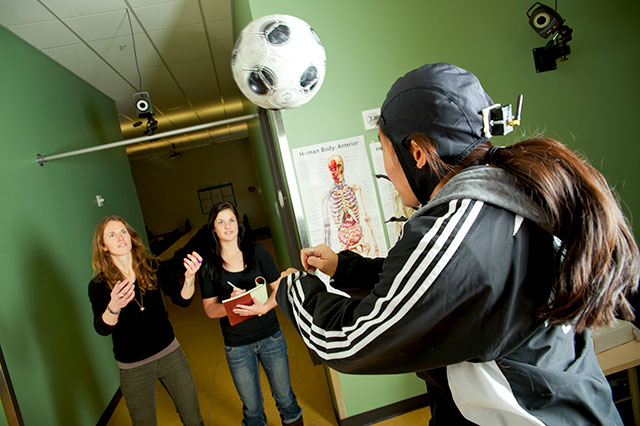
The study, conducted locally by HSU’s North Coast Concussion Program, prepares students for careers while serving college athletes and hundreds in the local community, and joins a massive national effort to improve the understanding, diagnosis, and recovery of concussions.
Late last year, the Program was awarded an additional $250,000 to continue its research as part of a national study funded by the NCAA and Department of Defense. Since 2015, the CARE Consortium has seen dozens of universities collect data on more than 50,000 athletes and military cadets, the largest concussion study in history.
Justus Ortega, an HSU Kinesiology professor and Director of the North Coast Concussion Program, says the local scope of the study has grown significantly, and that the next round of funding will allow researchers to continue expanding, while moving the study in new directions.
At its most basic, the Concussion Program has two functions: testing and community service. Researchers invite student-athletes and community members for baseline testing — which provides a sense of their cognitive functioning. Then, if someone receives a concussion, researchers can look back at this data for insights into how it affects them.
The other function, led by the Programs Service Coordinator Beth Larson, is educating the community and reaching out to additional sectors who may benefit from testing. First intended for intercollegiate student-athletes at HSU, the Concussion Program now does testing for club athletes, high school athletes in Humboldt and Del Norte counties, first responders, and others who’ve suffered concussions or are at risk. This, combined with information on best practices with local educators and healthcare professionals, has made it an important resource on the North Coast.
And it goes beyond there. After a visit from CSU Chancellor Timothy White, Ortega says they began the CSU Concussion Initiative; a collaborative program of assessing concussion protocols throughout the entire university system and consulting other CSU campuses about best practices in concussion management.
Club sports particularly lacked concussion management, Ortega says. “That has changed dramatically in the last few years because of our collaboration with the Chancellor’s Office, CSU Risk Management and the individual campuses.”
Now the Institute coordinates protocol for all 23 campuses, sharing assessment materials, best practices, trainings, and record-keeping methods. It also provides advice on implementation at different campuses.
The research itself has also changed—the entire national consortium is trying to understand recovery more fully, as successful diagnosis tools have been developed. They’re also trying to understand the mechanism of an injury—when, where, and why people are injured. For example, they’ve seen a disproportionate amount of injuries in preseason football—one theory is that athletes play harder when they’re trying to secure a starting position for the season.
Finally, they’re collecting DNA from willing participants in the study, looking to see if genetic identifiers make certain people predisposed to concussions. This, they hope, will allow future athletes a better understanding of their vulnerability to concussion, helping them make choices of sports, play style, and more.
That particular branch of research has caught the attention of Biology students, and student researchers from Biology Professor Amy Sprowles’ Biotechnology Laboratory have collaborated with the program. The program also works with the CNRS Core Research Facility to analyze biomarkers related to concussions. Additionally, psychology students have joined the study, creating an interconnected, interdisciplinary group of researchers.
“They’re influencing the international consensus on concussions,” Ortega says. “Students are seeing the direct impact of their work on real people and integrating research, service to the community, and the curriculum.”
Ortega says the experience has led to success for many graduates of the HSU Concussion Program who have gone onto prestigious graduate programs and medical schools.
“HSU is a great feeder school,” he says. “We’re known for high-level research, service, and collaborations, as well as hands-on skills that graduates need for successfully conducting these kinds of interdisciplinary, multi-dimensional projects.”